Related Research Articles

Horace Ward Martin Tavares Silver was an American jazz pianist, composer, and arranger, particularly in the hard bop style that he helped pioneer in the 1950s.

Soul jazz or funky jazz is a subgenre of jazz that incorporates strong influences from hard bop, blues, soul, gospel and rhythm and blues. Soul jazz is often characterized by organ trios featuring the Hammond organ and small combos including saxophone, brass instruments, electric guitar, bass, drums, piano, vocals and electric organ. Its origins were in the 1950s and early 1960s, with its heyday with popular audiences preceding the rise of jazz fusion in the late 1960s and 1970s. Prominent names in fusion ranged from bop pianists including Bobby Timmons and Junior Mance to a wide range of organists, saxophonists, pianists, drummers and electric guitarists including Jack McDuff, Eddie "Lockjaw" Davis, and Grant Green.

Aloysius Tyrone Foster is an American jazz drummer. Foster's professional career began in the mid-60s, when he played and recorded with hard bop and swing musicians including Blue Mitchell and Illinois Jacquet. Foster played jazz fusion with Miles Davis during the 70s and was one of the few people to have contact with Davis during his retirement from 1975 to 1980. During Davis's retirement, Foster continued to play and record acoustic jazz with Sonny Rollins, Dexter Gordon, McCoy Tyner, Horace Silver, and other band leaders. Foster played on Miles Davis's 1981 comeback album The Man with the Horn, and was the only musician to play in Davis's band both before, and after, his retirement. After leaving Davis's band in the mid-80s, Foster toured and recorded with Herbie Hancock, Sonny Rollins, Joe Henderson, and many other band leaders, primarily working in acoustic jazz settings. Foster has also released several solo albums under his own name, starting with Mixed Roots in 1978.

Edward Rudolph "Butch" Warren Jr. was an American jazz bassist who was active during the 1950s and 1960s.
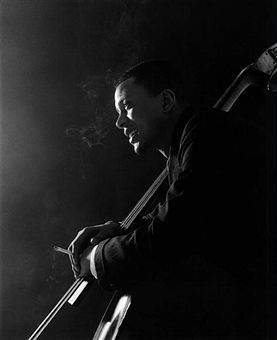
Douglas Watkins was an American jazz double bassist. He was best known for being an accompanist to various hard bop artists in the Detroit area, including Donald Byrd and Jackie McLean.
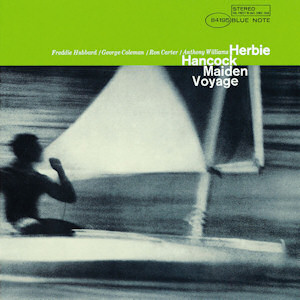
Maiden Voyage is the fifth album led by jazz musician Herbie Hancock, and was recorded by Rudy Van Gelder on March 17, 1965, for Blue Note Records. It was issued as BLP 4195 and BST 84195. Featuring Hancock with tenor saxophonist George Coleman, trumpeter Freddie Hubbard, bassist Ron Carter and drummer Tony Williams, it is a concept album aimed at creating an oceanic atmosphere. As such, many of the track titles refer to marine biology or the sea, and the musicians develop the concept through their use of space. The album was presented with the Grammy Hall of Fame Award in 1999.

Hand on the Torch is the debut studio album by British jazz rap group Us3. It received widespread attention due to its mixture of jazz with hip-hop music, with material from popular jazz musicians of the 20th century being reimagined. The samples used on the album are from old Blue Note Records classics: the most famous was Herbie Hancock's "Cantaloupe Island", which Us3 used on the track "Cantaloop ". It came out as a single having two different music videos.

Idris Muhammad was an American jazz drummer and bandleader. He had an extensive career performing jazz, funk, R&B, and soul music and recorded with musicians such as Ahmad Jamal, Lou Donaldson, Pharoah Sanders, Bob James, and Tete Montoliu.

George Edward Coleman is an American jazz saxophonist known for his work with Miles Davis and Herbie Hancock in the 1960s. In 2015, he was named an NEA Jazz Master.

The Jody Grind is a 1966 recording by Horace Silver featuring both a quintet and a sextet. Released the following year on his longtime label Blue Note, it peaked No. 8 of the Billboard jazz album charts. As one of his "groove-centered" recordings it would "wind up as possibly the most challenging", Steve Huey writes on Allmusic, and gave "one of the most underappreciated" of Silver's albums 4½ stars.
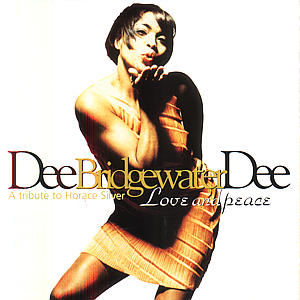
Love and Peace: A Tribute to Horace Silver is a 1995 studio album by Dee Dee Bridgewater, recorded in tribute to Horace Silver.

Joe Chambers is an American jazz drummer, pianist, vibraphonist and composer. He attended the Philadelphia Conservatory for one year. In the 1960s and 1970s, Chambers gigged with many high-profile artists such as Eric Dolphy, Charles Mingus, Wayne Shorter, and Chick Corea. During this period, his compositions were featured on some of the albums on which he appeared, such as those with Freddie Hubbard and Bobby Hutcherson. He has released fifteen albums as a bandleader and been a member of several incarnations of Max Roach's M'Boom percussion ensemble.
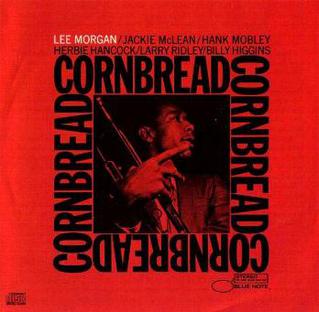
Cornbread is an album by American jazz trumpeter Lee Morgan. Recorded in September 1965 but released on the Blue Note label in early 1967, the album features performances by Morgan, along with sidemen Herbie Hancock, Billy Higgins, Jackie McLean, Hank Mobley, and Larry Ridley.

James Ralph Spaulding Jr. is an American jazz saxophonist and flutist.
Roger Humphries is an American jazz drummer.

The Procrastinator is an album by jazz trumpeter Lee Morgan released posthumously on the Blue Note label, featuring performances by Morgan, Wayne Shorter, Bobby Hutcherson, Herbie Hancock, Ron Carter and Billy Higgins. It was originally issued in 1978 as a double LP featuring tracks recorded in three different sessions: July 1967, September 1969 and October 1969. It was the last time Morgan recorded with Shorter in an association that lasted almost eight years.

That Healin' Feelin' is an album by jazz pianist Horace Silver released on the Blue Note label in 1970, featuring performances by Silver with Randy Brecker, George Coleman, Houston Person, Bob Cranshaw, Jimmy Lewis, Mickey Roker and Idris Muhammad with vocals by Andy Bey, Gail Nelson and Jackie Verdell. It is the first of a trilogy of albums later compiled on CD as The United States of Mind.
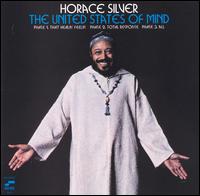
The United States of Mind is a compilation album by jazz pianist Horace Silver, released on the Blue Note label in 2004 compiling the three separate 'Phases' previously released as That Healin' Feelin' (1970), Total Response (1971) and All (1972). It features performances by Silver with Randy Brecker, George Coleman, Houston Person, Cecil Bridgewater, Harold Vick, Richie Resnicoff, Bob Cranshaw, Jimmy Lewis, Mickey Roker and Idris Muhammad, with vocals by Andy Bey, Salome Bey, Gail Nelson and Jackie Verdell.
In the late 1960s, Latin jazz, combining rhythms from African and Latin American countries, often played on instruments such as conga, timbale, güiro, and claves, with jazz and classical harmonies played on typical jazz instruments broke through. There are two main varieties: Afro-Cuban jazz was played in the US right after the bebop period, while Brazilian jazz became more popular in the 1960s. Afro-Cuban jazz began as a movement in the mid-1950s as bebop musicians such as Dizzy Gillespie and Billy Taylor started Afro-Cuban bands influenced by such Cuban and Puerto Rican musicians as Xavier Cugat, Tito Puente, and Arturo Sandoval. Brazilian jazz such as bossa nova is derived from samba, with influences from jazz and other 20th-century classical and popular music styles. Bossa is generally moderately paced, with melodies sung in Portuguese or English. The style was pioneered by Brazilians João Gilberto and Antônio Carlos Jobim. The related term jazz-samba describes an adaptation of bossa nova compositions to the jazz idiom by American performers such as Stan Getz and Charlie Byrd.
This is a discography of the recordings of Horace Silver, an American hard bop jazz pianist. His major discography consists of 36 studio albums, 3 live albums and 7 compilations.
References
- 1 2 "Eunice Vetta Ross Washington". The Star-Ledger. August 20, 2022. Retrieved December 9, 2022.
- ↑ "Tyrone Washington". Discogs. Retrieved 2023-06-14.
- ↑ Horace Silver - The Jody Grind Album Reviews, Songs & More | AllMusic , retrieved 2023-06-14
- ↑ Larry Young - Contrasts Album Reviews, Songs & More | AllMusic , retrieved 2023-06-14
- 1 2 "Tyrone Washington is incredible. Here's why". Steppin 2022. 2021-05-13. Retrieved 2023-06-14.
- ↑ Dryden, Ken, Natural Essence, Allmusic review, accessed March 30, 2013.
- 1 2 Tyrone Washington - Do Right Album Reviews, Songs & More | AllMusic , retrieved 2023-06-14
- 1 2 Jazz, All About (2006-12-08). "Tyrone Washington: Do Right album review @ All About Jazz". All About Jazz. Retrieved 2023-06-14.
- ↑ Sositko, Jason (October 25, 1914). "Whatever Happened to Tenor Saxophonist Tyrone Washington?". Special Anomaly. Retrieved June 14, 2023.